ELECTRIC STARTERS FOR MOTOR LORRIES.
Page 17

If you've noticed an error in this article please click here to report it so we can fix it.
A Manufacturer's Views Upon this Commercial Vehicle Refinement.
WILL THE after-the-war commercial motor among other improvements and refinements be fitted with electric starter and lighting? If rumour is not a misleading jade for once the heavy vehicle manufacturers of the United States propose to introduce the starter in some of their models in the near future. Indeed, certain builders are incorporating this convenient auxiliary in the war machines they have under way for the United States War Department. In order to ascertain the attitude of the British industry towards this development our representative sought out the managing director of one of our leading manufacturers.
"lo I think British manufacturers will fa electric starters to their cars after the war ? " he reiterated. "Well, it is our intention to equip cars up to a . definite h.p. with this refinement, This addition constitutes part and parcel of our programme to provide the utmost value for money. We feel certain such a refinement will be appreciated both by the driver and the owner of , those vehicles which from the very nature of their traffic are condemned to suffer frequent stopping and restarting. It will appeal to the driver because of the saving in physical exertion in cranking which it represents, while the owner will appreciate the saving in petrol attending its use."
"Will it be extended to the heavy lorry 1 " "That is a, vastly different proposition. At the moment I do not think it is possible to equip vehicles of ea tons and upwards, at all events not the heaviest chassis, with electric starting facilities. A direct negative must be qualified from the fact that the future of the British motor manufacturing industry is somewhat in the melting pot. There are so many other details demanding settlement as to render it impossible to venture a definite statement one way or the other.
"Laney opinion the one great deciding factor, se far as the British trade is concerned, is price. Assuming that such an equipment represents an additional cost of Rata this has get to be tacked on to the selling price of the vehicle, and it is questionable whether the quotation would stand it. Of course, if the customer especially desired the refinement it would be fitted."
' But surely an electric starter would solve the petrol wastage involved while the car is standing stationary?" "That is a powerful argument in favour of the auxiliary, but I doubt whether it would exercise any decisive influence upon the part of the owner. It is purely a matter of £ s. d. Supposing a heavy vehicle covers 50e mile& a week and averages 8 miles to the gallon. That represents a round 62 gallons of petrol per week. We will assume that the petrol wastage, due to running the engine while the car is stationary, amounts to two gallons per week.. It is only the cunwlative effect of the wastage, say, for a year, which arouses, attention, and even then it is doubtful whether it will bring home to the prospective buyer the advantages and saving to be recouped by an electric starter. Then it must not be forgotten that, although a vehicle be fitted with electric starter, it does not necessarily imply that the driver will use it as he should do. Some drivers even spurn such a simple device, especially in a traffic Hoek. It is more in ke'eping with human nature to run the engine, meanwhile anathematising the cause of the hold-up."
"But cannot the price be made inclusive instead of an extra? "
"Not under thepresent system of production. British Manufacturers are not so advantageously placed as their American. competitors. The 14tter from their large scale production could readily incorporate the electric starter and lighting and then sell at a lower figure than ourselves, inasmuch as their enormous output stands them in such good stead. The charges under the head of 'selling costs' are also higher in this country than in the United States."
"How about the light van?" was the next interpellation. " There, I think, the electric starter has a decided opportunity," came the reply. "The nature of this vehicle's duty with its house-to-house delivery, short runs between stoppages, and delays renders the incorporation of the device distinctly advantageous, because the quantity of petrol which it would save would be more pronounced. Generally speaking, the heavy vehicle being invariably reserved for long continuous runs, the necessity for restarting does not arise so frequently." "But would not the electric starter facilitate the sale of a car ? "
" I will readily concede that, from the salesman's point of view, the inclusion of the electric starter certainly comprises a strong talking point.' But the addition of to the vehicle's selling price is the great stumbling block. What is indispensable to the touring car may be considered a luxury on a commercial vehicle, especially when there is the possibility of the device failing to meet with appreciation or judicious application."
























